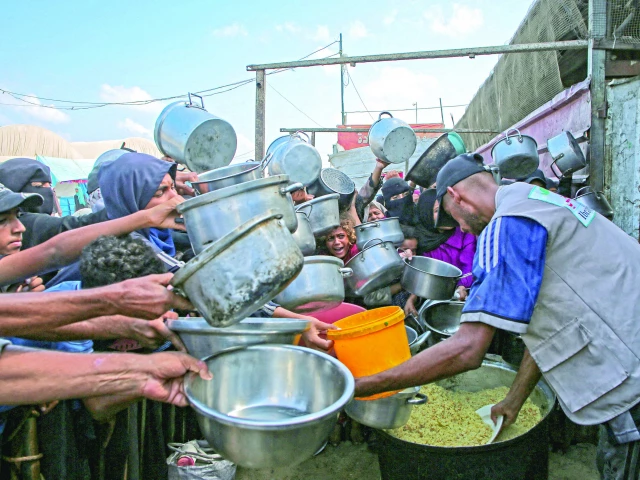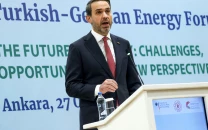International community reacts to Gaza famine confirmation
IPC warns famine is expected to spread to Deir el-Balah, Khan Younis by next month

The United Nations on Friday declared famine in Gaza City, the first such announcement in the Middle East and only the fifth-ever official declaration worldwide. The UN-backed Integrated Food Security Phase Classification (IPC) confirmed famine conditions in Gaza City and surrounding areas, warning that over 500,000 people face catastrophic hunger.
Famine isn’t just a word – it’s a technical term. And it’s never declared by one organization alone.
— World Food Programme (@WFP) August 22, 2025
A famine confirmation is the result of a joint, data-driven analysis using agreed global standards set by the IPC. #Gaza is only the fifth famine ever confirmed by this scale.… pic.twitter.com/4KM6NjMGCI
“It is a famine: the Gaza famine,” said UN emergency relief coordinator Tom Fletcher, blaming Israel for the crisis and accusing it of “systematic obstruction” of aid deliveries.
The Gaza Famine is the world’s famine. A preventable, predictable famine. ⁰⁰Enough. Ceasefire. Open all crossings, north and south. Let us get food in, unimpeded and at massive scale. pic.twitter.com/eB1x8uEgpV
— Tom Fletcher (@UNReliefChief) August 22, 2025
The IPC warned that famine is expected to spread to Deir el-Balah and Khan Younis by next month.
This comes after 22 months of war, during which Israeli forces destroyed infrastructure, blocked the entry of aid into the besieged Strip, and killed Palestinians as they searched for food. Since launching its offensive on Gaza in October 2023, the Israeli army has killed at least 58,667 Palestinians, including 17,400 children. More than 139,974 people have been injured, while over 14,222 remain missing and are presumed dead.
IPC said around 514,000 people — nearly a quarter of Gaza’s population — are already facing famine. The number is projected to rise to 641,000 by the end of September, it added.
In late May, the US- and Israeli-backed Gaza Humanitarian Foundation (GHF) assumed control of much of food distribution, sidelining UN agencies. The GHF relies on private contractors and military-linked firms, raising concerns about accountability and transparency. Humanitarian officials say this shift has made access more dangerous rather than easier.
Since the start of GHF operations, over 1,000 Palestinians have been killed and thousands wounded while seeking aid, according to figures cited by the UN. Of these, 766 people died near GHF aid points, while another 288 were killed near UN or other convoys. At least 516 deaths and nearly 3,800 injuries were documented within the first month alone.
Despite this, the US announced $30 million in funding for GHF, even as rights groups accused Israel of using starvation as a weapon. The death toll from aid queues continues to rise, underscoring how the blockade and GHF’s controversial role have combined to make humanitarian relief both scarce and deadly.
Famine Classification
The IPC - an initiative involving 21 aid groups, UN agencies and regional organizations funded by the European Union, Germany, Britain and Canada - has only registered famines four times previously - in Somalia in 2011, South Sudan in 2017 and 2020 and in Sudan in 2024.
For a region to be classified as in famine at least 20% of people must be suffering extreme food shortages, with one in three children acutely malnourished and two people out of every 10,000 dying daily from starvation or malnutrition and disease.
United Nations
UN Secretary-General Antonio Guterres described the famine in Gaza as a “man-made disaster, a moral indictment, and a failure of humanity itself.”
“Famine is not only about food; it is the deliberate collapse of the systems needed for human survival,” Guterres said. “People are starving. Children are dying. And those with the duty to act are failing.”
He said Israel, as the occupying power, had “unequivocal obligations” under international law to ensure food and medical supplies reached Gaza’s population.
Philippe Lazzarini, head of the UN agency for Palestinian refugees (UNRWA), said repeated warnings of famine in Gaza had been ignored. “Months of warnings have fallen on deaf ears,” he said, adding that with famine now confirmed in Gaza City and nearby areas, “it is time for political will” to end it.
Months of warnings have fallen on deaf ears. #famine is now confirmed in #Gaza city.
— Philippe Lazzarini (@UNLazzarini) August 22, 2025
This is starvation by design & manmade by the Government of Israel.
It is the direct result of banning food & other basic supplies for months including from @UNRWA.
The spread of famine…
Israel
Israeli Prime Minister Benjamin Netanyahu rejected the UN-backed declaration that famine had taken hold in parts of Gaza, calling the report “an outright lie.”
“Israel does not have a policy of starvation,” Netanyahu said in a statement issued by his office, pointing to the delivery of humanitarian aid into Gaza during the war.
In May, food distribution in Gaza was handed over to the controversial, Israel- and US-backed Global Humanitarian Foundation (GHF). Since then, Gaza’s Health Ministry has reported that more than 2,000 Palestinians seeking aid have been killed.
Hamas
Hamas urged an immediate end to the war and the lifting of Israel’s blockade following the UN famine declaration.
In an online statement, Hamas called for “immediate action by the UN and the Security Council to stop the war and lift the siege,” demanding that border crossings be opened “without restrictions to allow the urgent and continuous entry of food, medicine, water and fuel.”
The group said the UN announcement confirmed the “humanitarian catastrophe” in Gaza and accused Israel of wielding starvation as a “tool of war.”
Gaza’s Government Media Office and Palestinian Authority
Gaza’s Government Media Office said the UN-backed famine report confirmed that starvation in the enclave was “a proven fact” that could constitute war crimes.
“The reality in Gaza is even more grave and catastrophic than depicted in the report,” the office said in a statement, urging international intervention.
Citing Israeli figures showing only a few dozen trucks of aid entering Gaza in recent weeks, the office said the numbers “incriminate, not exonerate” Israeli authorities.
It added that the IPC’s technical findings meant famine was now “a fact that cannot be manipulated by Israel or its allies” and warned that “any state or organisation that turns a blind eye to this crime becomes complicit in its continuation and falls under the scope of international law.”
Meanwhile, the Palestinian Authority’s Foreign Ministry said the IPC assessment “closed the door to interpretation and speculation regarding the occurrence of famine.”
“What is required now, before it is too late, is the mobilisation of international influence in all its forms and dimensions to immediately halt the famine and the aggression against our people,” the ministry said in a statement on social media.
It called on the UN Security Council and the international community “to address with utmost seriousness and concern” the report’s findings, adding that Israel was “destroying all aspects and components of human life in the Gaza Strip and committing the crime of using starvation as a weapon in the war against Palestinian civilians.”
Amnesty International, Red Cross, Oxfam, Islamic Relief
Amnesty International said the crisis was the result of Israel’s “deliberate campaign of starvation.”
“This famine is the direct consequence of Israel’s deliberate campaign of starvation in Gaza,” said Erika Guevara Rosas, Amnesty’s senior director for research, advocacy, policy and campaigns.
She called the IPC declaration “a scathing indictment of the failure of states to press Israel into ending its genocide in the occupied Gaza Strip.”
“The deliberate obstruction of humanitarian aid, the destruction of life-sustaining infrastructure, and the direct killings of civilians are a clear manifestation of how Israel is inflicting conditions of life calculated to bring about the physical destruction of Palestinians in Gaza as part of its ongoing genocide,” she said, warning: “History will never forgive us for standing by as emaciated children die, while food remains just miles away, yet blocked by Israel.”
The International Committee of the Red Cross said Israel must meet Gaza’s basic needs for food, water and medicine after what it called the “devastating and entirely foreseeable” report.
“Under international humanitarian law, Israel, as the occupying power, must ensure that the basic needs of the civilian population in Gaza are met, using all the resources it has available,” the ICRC said in a statement, adding the famine declaration “must serve as a catalyst for immediate and concrete action.”
Oxfam said the famine warning confirmed what it and its partners had been documenting for months.
“The famine in Gaza is entirely driven by Israel’s near-total blockade on food and vital aid, the horrifying consequence of Israel’s violence, and its use of starvation as a weapon of war,” said Helen Stawski, policy lead at Oxfam GB.
She said Oxfam had over $3.3 million worth of aid, including high-calorie food packs, sitting in warehouses outside Gaza. “Israeli authorities have rejected it all, at a time when it is needed more than ever,” she added.
Islamic Relief said the declaration “brings shame on the entire world.”
“Every day our team there sees more people starving to death and children turning into living skeletons before our eyes,” the group said in a statement. “Many more will die unless the world acts now.”
United Kingdom
UK Foreign Secretary David Lammy denounced the famine in Gaza as a “moral outrage” and “man-made catastrophe.”
“The confirmation of famine in Gaza City and the surrounding neighbourhood is utterly horrifying and is wholly preventable,” Lammy said in a statement.
Saudi Arabia
Saudi Arabia voiced alarm over the IPC’s famine declaration, warning that the worsening conditions in Gaza “will remain a stain on the international community.”
The crisis, the Saudi Foreign Ministry said, was “a direct result of the absence of deterrence and accountability mechanisms for the repeated crimes of the Israeli occupation.”
Riyadh urged the UN Security Council to “quickly intervene immediately to end the famine and stop the war of genocide and crimes committed by Israel against Palestine.”
Kuwait
Kuwait condemned what it described as Israel’s “policy of starvation, oppression, and displacement” targeting civilians in Gaza.
The Foreign Ministry said the policy amounted to “a blatant violation of international law and international humanitarian law” as well as UN Security Council resolutions.
It called on the global community and the Security Council to act “to allow the urgent entry of humanitarian aid into the Gaza Strip, to halt the genocide being perpetrated against the brotherly Palestinian people, and to hold the occupying power accountable for the crimes it commits against humanity.”
Gulf Cooperation Council
Gulf Cooperation Council Secretary-General Jasem Mohamed Albudaiwi pressed for urgent international efforts to force Israel to open border crossings and allow unrestricted humanitarian access.
Albudaiwi said the IPC’s confirmation of famine at “catastrophic levels” in Gaza “clearly reflects the dangerous, inhumane, and illegal starvation policies pursued by the Israeli occupation forces against the brotherly Palestinian people.”




















COMMENTS
Comments are moderated and generally will be posted if they are on-topic and not abusive.
For more information, please see our Comments FAQ